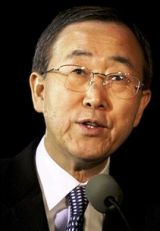Sudan, UN agree to accelerate Darfur peacekeepers
January 30, 2008 (ADDIS ABABA) – Sudan and the United Nations have agreed to speed up the deployment of the hybrid peacekeeping troops to the war-torn Darfur region and to finalize the status-of-forces agreement for the mission.

Sudanese President Omer Al-Bashir and UN Secretary General, Ban Ki-Moon agreed during a meeting held in the Ethiopian capital to accelerate the deployment of the 26000 troops operation in Darfur in order to restore security and quell human rights violations in the region.
The government is still negotiating the legal framework for the force, and even objects to the color of their helmets, which it wants to keep green in the case of African troops.
The two parties didn’t make statements on controversial issues like the non African troops that the UN wants on the ground like the Nordic units and the Nepalese troops.
Sudan also wants the status of forces agreement to include provisions on communications and the movement of troops and personnel, which the UN considers as obstructions that may paralyze the peacekeeping mission.
The silence of the two parties after the meeting might be considered as sign of persistence of disagreement.
International experts estimate 200,000 people have died in the conflict, which Washington calls genocide, a term European governments are reluctant to use. The Sudan government says 9,000 people have been killed.
UN Security Council resolution 1769 establishing UN-AU hybrid force provided for a transition from the African Union Mission in Sudan (AMIS) to the force known as UNAMID by December 31st.
Sudan’s Foreign Minister, Deng Alor, said President Al-Bashir tackled in a meeting with the AU chief Alpha Oumer Konare the importance of coordination between the government of Sudan, the African Union and the United Nations before taking any decision on the hybrid operation in Darfur.
He added that agreement was reached between the two sides on the necessity of coordination, explaining that in this connection two offices for the AU would be established in Addis Ababa and Khartoum for coordination pertinent to the hybrid operation in Darfur.
He pointed out that further meetings would be held between Sudan and the AU for establishment of coordination and executive mechanisms on Darfur, especially the hybrid operation there.
(ST)

ENOUGH Project
Sudan, UN agree to accelerate Darfur peacekeepers
Democracy: A Key to Peace In Sudan
By: John Prendergast and Roger Winter
01/09/2008
The establishment of strong democratic institutions and processes in Sudan will be a key prerequisite for peace in Darfur and the South. By setting forth a timetable for elections, the 2005 Comprehensive Peace Agreement seeks to give Sudanese citizens significantly more control in how their country is governed. However, the CPA election clock is ticking and neither the institutional foundations nor the requisite electoral processes are in place. These electoral processes in the context of the implementation of the CPA provide Sudan’s best hope for peace—a political transformation through democracy.
There are three major electoral milestones critical to the implementation of the CPA over the next three years: 1) the population census in April 2008; 2) the national elections by July 2009; and 3) a self-determination referendum for Southern Sudan by March 2011. [1]
To continue reading the remainder of the report, please go to the ENOUGH Project website:
http://www.enoughproject.org/node/577